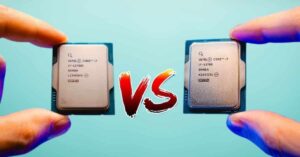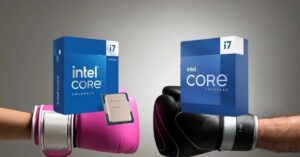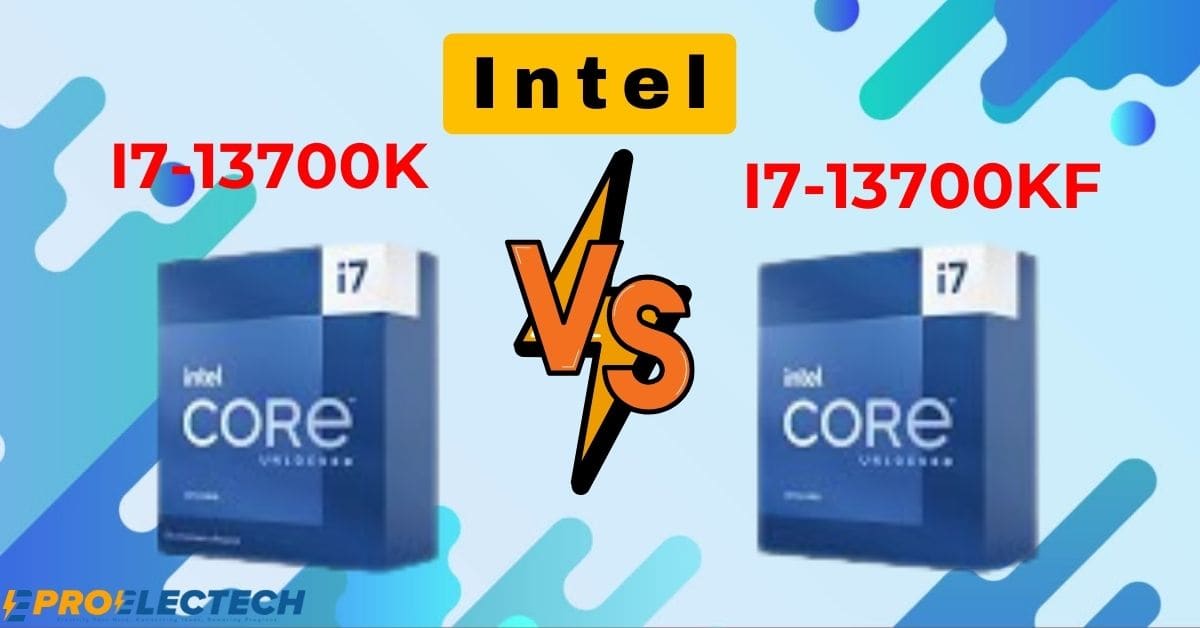The launch of Intel’s 13700k and 13700kf processors has stimulated vibrant discussion amongst gamers, P.C. enthusiasts, and content creators.
Both chips promise robust performance, but understanding their differences is crucial to choosing the right one for your needs. In this article, we’ll dissect the variations between the Intel 13700k and 13700kf, analyzing performance metrics, price, and other factors to help you make an informed decision. 13700K vs 13700KF Comparison
Key Differences
Integrated Graphics
The most noticeable distinction lies in the graphics capabilities. The 13700k includes integrated graphics, making it versatile for tasks that require GPU support even without a dedicated video card.
On the other hand, the 13700kf lacks this feature, positioning it as a specialized tool for users with an existing discrete graphics solution.
This makes the 13700kf a more budget-friendly option for those who don’t need integrated graphics.
Base Clock Speed
Performance is king, and base clock speed is a crucial factor. While exact numbers may vary, the 13700k’s higher base clock promises faster out-the-box performance, which could be a deciding factor for activities that are heavily CPU-dependent.

Which should you choose?
While the two processors share many similarities, their differences can impact usage scenarios.
The 13700k is ideal for those who need integrated graphics, while the 13700kf caters to users with a dedicated GPU. Additionally, gamers prefer the 13700kf’s lower price point, allowing them to allocate more funds toward a high-end graphics card. Ultimately, the right choice depends on your specific needs and budget.
Other Factors to Consider
Other factors that could influence your decision include overclocking potential, power consumption, and socket compatibility with your motherboard. Additionally, consider your intended usage scenarios and whether integrated graphics are necessary for tasks such as video editing or streaming. Researching benchmark tests and user reviews can also provide valuable insights into real-world performance comparisons between the two processors.
Overclocking and Flexibility
The ability to overclock adds appeal to the 13700k for enthusiasts and power users who revel in optimizing their systems’ performance. Although not available in the 13700kf, only some users will notice this feature.
Furthermore, the 13700kf offers a more flexible and customizable option for those who prefer to choose their own graphics card.
Use Without Dedicated GPU
For those not intending to use a dedicated GPU, the 13700k clearly stands as the more suitable processor, providing that all-in-one solution. However, keep in mind that the integrated graphics are not as powerful as a dedicated GPU and might not meet the needs of more demanding tasks.
In this case, upgrading to a higher-end processor or adding a dedicated graphics card would be necessary.
Performance Analysis
Assessments across various tasks and benchmarks offer a clearer perception of how each processor performs under pressure:

Gaming Performance
Gamers looking to achieve the best possible frame rates prefer the 13700kf. Despite its slightly lower base clock, it’s capable of higher overclocking potential and offers better gaming performance when paired with a high-end graphics card. However, for those who don’t prioritize maximum frame rates, the 13700k may suffice.
Content Creation and Productivity
For content creators, the 13700k is a more well-rounded option due to its integrated graphics capability. This processor may also appeal to those who require higher multi-threaded performance for tasks such as video editing or 3D rendering.
CPU-Intensive Tasks
Video editors and content creators will benefit from detailed analysis in heavy applications. Here, both processors are expected to shine, with potential subtle advantages to the 13700k due to its base clock advantage.
However, the difference may be less noticeable in real-world usage.
Power Consumption
While both processors have similar TDP ratings, the 13700k may draw more power when using its integrated graphics.
This could be a factor to consider for users with limited power supply or those looking to minimize energy consumption.
Thermal and Power Efficiency
Efficiency is a tale of two factors: heat and power consumption. Gamers and builders managing tight thermal envelopes or power-draw limits will find this information crucial.
From a thermal efficiency perspective, the 13700kf may have an edge due to its lack of integrated graphics and lower TDP.
However, the power consumption differences between the two processors will likely be negligible.
Synthetic Benchmarks
Comprehensive tools like Cinebench and 3DMark offer a synthesized overview bridging gaming and general performance. The numbers here support an objective comparison beyond subjective use cases.
However, it’s worth noting that real-world usage may differ from synthetic benchmarks, so take these results with a grain of salt.
Intel 13700k
Pros:
- Integrated graphics for flexibility
- Higher base clock speed
- Overclockable for performance tuning
Cons:
- Higher price point
- Potentially unnecessary features for users with a dedicated GPU
Intel 13700kf
Pros:
- Cost-effective if you already own a dedicated GPU
- Matches the power of the 13700k in CPU-bound tasks
Cons:
- No integrated graphics reduce flexibility
- Not suitable for users without a discrete graphics solution
Audience Consideration
Our comparison offers unique insights for different users. Gamers with already powerful GPUs may lean towards the 13700kf, enjoying a similar performance at a reduced cost.
Those looking for a one-stop-shop CPU for both processing and graphics will gravitate to the 13700k.
Content creators should weigh the price against their need for integrated graphics and computing power. In the end, it’s essential to consider your specific needs and use cases to make an informed choice.
Overall, both processors are excellent options for different user groups, offering competitive performance in their respective categories.
As technology advances and new generations of processors emerge, we can only expect even more power-efficient and feature-rich options from Intel. It all boils down to finding the right
Price Consideration
Affordability can define a purchase, and the 13700kf is typically less expensive, reflecting the cost savings from omitting the integrated graphics. This price gap could influence budget-conscious buyers, especially if the rest of the specs meet their requirements.
Check The price intel Core i7-13700K
Check The price intel Core i7-13700KF
Frequently Asked Questions (FAQ)
Can the Intel 13700kf be used for gaming without a dedicated GPU?
No, the Intel 13700kf lacks integrated graphics, making it necessary to have a dedicated GPU for gaming or any task requiring graphical output.
Is the overclocking potential the same for both the 13700k and 13700kf?
Both processors have overclocking capabilities, but the 13700kf might offer more headroom due to its lack of integrated graphics, which could potentially lead to lower temperatures and better stability when overclocked.
For content creation, which processor is recommended?
The Intel 13700k is generally recommended for content creators due to its integrated graphics, which can be helpful for tasks that don’t require a high-end dedicated GPU.
However, if you already have a powerful GPU, the 13700kf can match the 13700k in performance for CPU-intensive tasks.
Are there significant power consumption differences between the two processors?
Both processors have similar TDP ratings, but the 13700k might consume slightly more power when its integrated graphics are in use. For most users, the difference in power consumption will be negligible.
How do I decide which processor is suitable for me?
Consider your specific needs, such as whether you have or plan to buy a dedicated GPU, your performance requirements for gaming or content creation, and your budget.
The 13700kf is ideal if you prioritize CPU performance and have a discrete graphics solution, while the 13700k serves well for those needing an all-in-one solution or lacking a high-end GPU.
Does 13700KF have integrated graphics?
No, the Intel Core i7-13700KF does not have integrated graphics. The “F” in its model name indicates that it lacks an onboard GPU, requiring discrete graphics for display output.
When was Intel 14th generation released?
The Intel 14th generation, known as Meteor Lake, has not been officially released as of my last update. Its release is anticipated in late 2023 or early 2024.
What does KF mean in Intel?
In Intel’s naming scheme, “KF” indicates two characteristics of the processor. The “K” signifies that the processor is unlocked and can be overclocked, while the “F” means that the processor does not have integrated graphics.
When did Intel 15th gen come out?
The 15th generation of Intel processors, referred to as Arrow Lake, has not been released yet. It is expected to launch sometime after the 14th generation, potentially in 2024 or later.
What is the next Intel processor in 2024?
Intel’s roadmap includes plans for the release of the 14th generation (Meteor Lake) and potentially the 15th generation (Arrow Lake) processors around or after 2024. Exact details and naming may change as the development progresses.
Will Intel 15th Gen support DDR4?
It is expected that Intel’s 15th generation processors will primarily support DDR5 memory, as the industry moves towards newer, faster memory technologies. However, complete information will only be available closer to its release.
What Intel processors are coming to 2024?
Intel has plans to release its 14th generation Meteor Lake processors and potentially start introducing its 15th generation Arrow Lake processors around 2024, focusing on further innovations in performance, efficiency, and technology support.
How much will Intel 14th gen cost?
The pricing for Intel’s 14th generation Meteor Lake processors has not been announced. Pricing will be detailed closer to the launch date, based on the lineup and specific processor models.
What is Intel’s most powerful CPU?
As of my last update, Intel’s most powerful consumer CPU is part of the Core i9 lineup, with the i9-12900KS being one of the top performers, offering high core counts and exceptional speeds for gaming and professional applications.
Which Intel processor discontinued?
Intel has discontinued various processors over the years, often as newer generations become available. Specific models or generations being discontinued depend on the time frame and technological advancements.
Is Intel becoming obsolete?
Intel continues to be a major player in the semiconductor industry, constantly evolving and innovating to meet technological demands. While it faces strong competition, calling it obsolete would disregard its ongoing contributions and developments.
Why is Intel declining?
Intel has faced challenges, including competition from other semiconductor companies and delays in advancing to more efficient manufacturing processes. However, it is actively working on new strategies and technologies to maintain its competitive edge.
Why did Apple stop using Intel processors?
Apple transitioned to its custom-designed silicon, the Apple M1 chip, to have more control over the performance and energy efficiency of its devices, integrating hardware and software more seamlessly.
Is Apple silicon better than Intel?
Apple silicon, starting with the M1 chip, has demonstrated impressive performance and efficiency improvements in Apple’s ecosystem. Whether it is “better” than Intel depends on specific use cases, workloads, and the optimization of software for each platform.
Is it worth buying an Intel Mac now?
The value of purchasing an Intel-based Mac depends on individual needs, including software compatibility, performance requirements, and personal preference for Mac OS. With Apple’s transition to its silicon, future software support should be considered.
Who owns Intel?
Intel is a publicly traded company, meaning it is owned by its shareholders. The largest shareholders typically include institutional investors and fund companies.
Does Warren Buffett own Intel stock?
Warren Buffett’s investment company, Berkshire Hathaway, has owned Intel stock in the past, but its current portfolio changes with market conditions, and specific holdings can vary over time.
What was the old name of Intel?
Intel was originally founded as NM Electronics in 1968 but was quickly renamed Intel, which stands for Integrated Electronics.
Did Intel have a monopoly?
Intel has been a dominant player in the semiconductor industry, particularly in the PC and server processor sectors. While it has held significant market share, the term “monopoly” is legally defined and has been subject to regulatory scrutiny.
What company is almost a monopoly?
Companies in various industries, including tech giants like Google in online search, have been accused of monopolistic practices. However, “almost a monopoly” is subjective and varies across different markets and legal jurisdictions.
Is Google having a monopoly?
Google holds a dominant position in the online search and advertising market, leading to allegations of monopolistic behavior. Regulatory bodies in several countries have scrutinized its practices, but it operates in a competitive digital ecosystem.
Who has monopoly on chips?
No single company has a monopoly on semiconductor chips, as the industry comprises various sectors, including CPUs, GPUs, and specialized chips, with companies like Intel, AMD, Nvidia, and TSMC playing significant roles.
Why is TSMC so successful?
TSMC’s success can be attributed to its pioneering of the foundry business model, investing heavily in advanced manufacturing technologies, and its ability to maintain strong relationships with major tech companies, ensuring a steady demand for its semiconductor manufacturing services.
Who is the most advanced chip maker in the world?
TSMC is often considered the most advanced chip maker, leading in manufacturing technologies like the 5-nanometer process. It serves clients that design cutting-edge chips for various applications, maintaining a significant edge over competitors in process technology.
Who is the world’s largest chip maker?
TSMC is the world’s largest dedicated independent semiconductor foundry, based on revenue and manufacturing capacity, serving clients across various sectors of the electronics industry.
Who owns TSMC?
TSMC, or Taiwan Semiconductor Manufacturing Company, is publicly traded, owned by its shareholders. Its largest shareholders include institutional investors and individuals from around the world.
Who competes with TSMC?
Key competitors to TSMC in the semiconductor foundry sector include Samsung Electronics and GlobalFoundries, among others. These companies compete in manufacturing capacity, technology nodes, and client relations.
What chip company makes the most money?
TSMC, with its vast client base and leadership in advanced semiconductor manufacturing technologies, is among the chip companies generating the most revenue worldwide.
Who is the leader in semiconductor?
The leadership in the semiconductor industry can be segmented by market sectors, such as Intel in CPUs, Samsung in memory chips, and TSMC in foundry services, each dominating different aspects of the ecosystem.
Who are the top 5 chip makers?
The top semiconductor manufacturers typically include TSMC, Samsung Electronics, Intel, SK Hynix, and Micron Technology, based on revenue and market share in their respective segments.
What is the #1 chip brand?
The #1 chip brand in terms of market presence and consumer preference can vary greatly by region and product type, including snack chips and semiconductor chips.
In consumer electronics, major brands include Intel, Samsung, and TSMC for their market influence and technological advancements.
What is the future of chip manufacturing?
The future of chip manufacturing is expected to continue pushing technological boundaries, with advancements in areas like AI and 5G driving demand for more powerful and efficient chips.
Companies are also exploring new materials and processes, such as quantum computing and 3D stacking, to improve performance and reduce costs. Additionally, there is a growing focus on sustainability and environmental
Conclusion
In essence, the choice between the 13700k and 13700kf is contingent on individual needs and existing hardware.
For those with a powerful GPU already in play, the 13700kf is a potent tool that offers all the CPU performance of its sibling without excess features.
Meanwhile, the 13700k is the undeniable choice for users seeking an all-around performer capable of basic graphic tasks without additional hardware.
Remember: No matter which processor you choose, the Intel 13700k and 13700kf stand as formidable foundations for your computing endeavours.
Armed with knowledge, may your decision lead to a system that fits your every need.
Watch helpful video: 13700K vs 13700KF Comparison
Check The price intel Core i7-13700K
Check The price intel Core i7-13700KF

Name: Jonathan A. Techsavvy
Education: B.Sc. in Electrical Engineering
Specialization: Consumer Electronics – TVs, Cameras, Speakers, Headphones
Notable Publications: Innovate – Contributing Technology Analyst
Key Achievements: Recipient of the ‘Electronics Insight Award’ for excellence in product analysis (2020)
Hobbies: Photography, Audiophilia, Mountain Biking
Professional Philosophy: Merge the analytical with the accessible to demystify technology for consumers.
